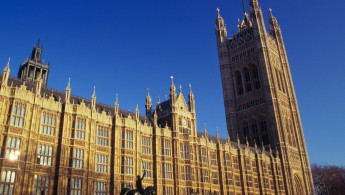UK peers block government bid to restrict war crimes prosecutions of British soldiers
The House of Lords voted by 333 to 228 to halt the proposal which would have set a five-year deadline for the prosecution of British soldiers stationed overseas for suspected war crimes.
This vote was part of the drafting process of the Overseas Operations Bill, which was approved by MPs in November.
Conservative ministers said the bill would stop "ambulance-chasing" lawyers using false claims to prosecute UK soldiers.
This defeat of the Boris Johnson government was led by former NATO Secretary General George Robertson who said the plan would have "undermined some of the most basic legal standards for which this nation was renowned".
"Our troops might, for the first time, have to appear in front of the international criminal court," Roberston, who was also a former Labour defence secretary, said.
Annabel Goldie, a junior defence minister, attacked the amendment saying the bill held "a fair and deserved level of protection" for soldiers abroad.
The Overseas Operations Bill would raise the threshold prosecutors could use in deciding whether to pursue a case after five years to "exceptional".
They would have to weigh the public interest and get consent from the attorney general before prosecuting.
It would also restrict the discretion of courts to extend time limits for bringing civil claims for personal injuries, deaths and human rights act violations, to a maximum of six years.
Read more: A shameful free pass for war crimes in Iraq
The act would also have future governments consider overriding the European Convention on Human Rights (ECHR) in relation to significant overseas operations.
However, the government said such operations will continue to be governed by other international humanitarian laws.
The defence ministry said around 70 percent of allegations received by the independent Iraq Historic Allegations Team were dismissed because "there was no case to answer".
But the UK military has been accused of covering up credible evidence of war crimes in Afghanistan and Iraq, according to leaks last year from two government-ordered inquiries.
In June, an independent British investigator looking into the Iraqi allegations and claimed that all but one of the thousands of complaints - which ranged from rape and torture to mock executions - had been dropped.
That followed a 2017 UK tribunal ruling that ex-lawyer Phil Shiner, who investigated and chronicled hundreds of the accounts of such crimes, was guilty of misconduct and dishonesty.
Follow us on Facebook, Twitter and Instagram to stay connected





 Follow the Middle East's top stories in English at The New Arab on Google News
Follow the Middle East's top stories in English at The New Arab on Google News
![The UAE is widely suspected of arming the RSF militia [Getty]](/sites/default/files/styles/image_330x185/public/2024-11/GettyImages-472529908.jpg?h=69f2b9d0&itok=Yauw3YTG)
![Netanyahu furiously denounced the ICC [Getty]](/sites/default/files/styles/image_330x185/public/2024-11/GettyImages-2169352575.jpg?h=199d8c1f&itok=-vRiruf5)
![Both Hamas and the Palestinian Authority welcomed the ICC arrest warrants [Getty]](/sites/default/files/styles/image_330x185/public/2024-11/GettyImages-2178351173.jpg?h=199d8c1f&itok=TV858iVg)